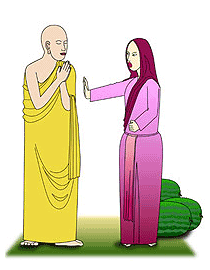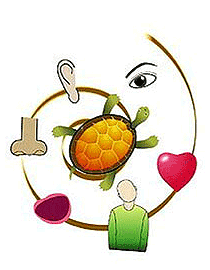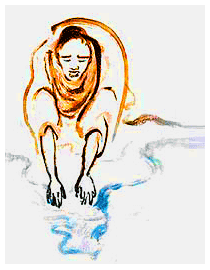Requesting a Watermelon
 One day, Shakyamuni Buddha went for a walk with two of his disciples, Mahakasyapa and Ananda. As noon was approaching, the group of three started to feel thirsty, and decided to rest under a tree alongside the road. The Buddha saw that nearby there was a melon patch, and requested Ananda to go up ahead and beg for a watermelon in order to quench their thirst. When Ananda arrived at the melon patch he saw a young woman who was watching guard over the watermelons. Ananda approached the woman and politely spoke, “My teacher, Shakyamuni Buddha, has walked over to this place, and he is hungry and thirsty. Would you mind offering one of your watermelons to me, so that I could go back and care for my master?” Before Ananda could even finish speaking, the woman became very angry, and refused Ananda’s request. She then, using abusive language, demanded Ananda to immediately get out of her field. One day, Shakyamuni Buddha went for a walk with two of his disciples, Mahakasyapa and Ananda. As noon was approaching, the group of three started to feel thirsty, and decided to rest under a tree alongside the road. The Buddha saw that nearby there was a melon patch, and requested Ananda to go up ahead and beg for a watermelon in order to quench their thirst. When Ananda arrived at the melon patch he saw a young woman who was watching guard over the watermelons. Ananda approached the woman and politely spoke, “My teacher, Shakyamuni Buddha, has walked over to this place, and he is hungry and thirsty. Would you mind offering one of your watermelons to me, so that I could go back and care for my master?” Before Ananda could even finish speaking, the woman became very angry, and refused Ananda’s request. She then, using abusive language, demanded Ananda to immediately get out of her field.
Ananda very discouragingly walked back to the tree and reported the entire sequence of events to the Buddha. The Buddha was not surprised to hear what had happened, and instead smilingly turned towards Mahakasyapa and said, “Mahakasyapa, it’s your turn to go beg for alms!” Ananda thought to himself, “That woman is unwilling to make a donation, how will Mahakasyapa ever have a chance of successfully getting one of her watermelons?”
After hearing about Ananda’s unsuccessful attempt to get a watermelon, Mahakasyapa had very little confidence in himself that he would be able to do any better, but because of the Buddha’s urging, and knowing that the Buddha likely had a deep inner meaning behind his words, Mahakasyapa got up and walked over to the melon patch. He had not expected that, as soon as the woman saw him approaching her field, she would cheerfully stand up and proceed to prostrate to Mahakasyapa, then repeatedly inquire to the sage about where he had come from, where he wanted to go, and whether or not he needed any food to relieve his hunger. Mahakasyapa had not even the chance to make his request for food, when the woman on her own accord picked up the largest and sweetest watermelon and offered it to the sage. When Ananda saw Mahakasyapa walking back holding the big watermelon, he became completely baffled. The Buddha thus explained the cause and effect relationship to Ananda and Mahakasyapa so that they could understand the events that had just taken place.
Tens of thousands of eons ago, Mahakasyapa and Ananda at the same time left the home life and joined the monastic order. The two would often go on journeys together to various monasteries to visit the enlightened masters. On one of their trips, with Ananda walking in the front and Mahakasyapa walking behind him, they came along a dead cat lying on the road. Because it was currently the height of summer, the corpse was giving off a very rancid odor of decaying flesh, and the body was full of crawling maggots which were nibbling on the corpse’s rotting flesh. As soon as Ananda saw this cat’s body, he immediately plugged his nose and hastily ran away. Meanwhile, Mahakasyapa, when coming across the sight and stench of this rotting corpse, mercifully proceeded to transmit the three refuges to it, and then dug a hole on the side of the road for the body to be buried in. As he was burying the cat, he wished for it to be soon reborn in a higher realm of existence.
After Shakyamuni Buddha finished speaking of these causal events of their previous lives, he followed by giving a short Dharma talk to his two disciples. “That woman working in the melon patch is the reincarnation of the dead cat from long ago. Due to Mahakasyapa’s blessings and transmitting of the three refuges, that cat was able to be reborn in the human realm. Because of this, as soon as the woman saw Mahakasyapa approaching, she immediately became filled with joy. On the other hand, because Ananda held the thought of disgust and aversion when he saw the dead cat, he was not only refused the watermelon, he was also insulted by the woman.” After hearing the Buddha’s words, the two disciples clearly understood and believed in the indubitable truth of the principle of cause and effect.
Reflection
We often hear in the Dharma, “Before we attain Buddhahood, we should first cultivate good affinities with all human beings.” If we would like our future to be bright and free of obstacles, we should always make friendly connections with all living beings. Having cultivated the causes and conditions that would benefit others, we can easily attain success in whatever endeavors we ourselves undertake. (TOP) |
The Turtle and the Hungry Fox
 Long ago, when the Buddha was still present in this world, there was a monk who lived far away from the clamour of the towns and cities. One day, he came down to the riverside by the secluded forest in which he lived and sat down alone in meditation under a tree, with the hope of attaining enlightenment. Although he lived a very quiet life in this forest and appeared as though he had no cravings, in reality, the strong desires of his mind were always ready to make trouble for him. When he tasted delectable fruits and vegetables, drank sweet spring water, or enjoyed the surrounding beautiful scenery, he felt at ease and carefree. If he ever came across poor weather, or unsavory foods and drinks, he would become irritated, even to the point of blaming everyone and everything around him. His thoughts, always following the external world of form, sound, smell, taste and touch, continuously rose and fall like the waves of the sea. At times he would be extremely happy, at other times in states of deep despair, but all along he had no way of quieting his mind. And in this way, each day became the next, with springs departing and falls arriving, twelve years flew by. This monk had still not achieved the Dao, and because of this, many vexations arose in his mind. He thought: I am hardworking and diligent, why am I still just a common man? Long ago, when the Buddha was still present in this world, there was a monk who lived far away from the clamour of the towns and cities. One day, he came down to the riverside by the secluded forest in which he lived and sat down alone in meditation under a tree, with the hope of attaining enlightenment. Although he lived a very quiet life in this forest and appeared as though he had no cravings, in reality, the strong desires of his mind were always ready to make trouble for him. When he tasted delectable fruits and vegetables, drank sweet spring water, or enjoyed the surrounding beautiful scenery, he felt at ease and carefree. If he ever came across poor weather, or unsavory foods and drinks, he would become irritated, even to the point of blaming everyone and everything around him. His thoughts, always following the external world of form, sound, smell, taste and touch, continuously rose and fall like the waves of the sea. At times he would be extremely happy, at other times in states of deep despair, but all along he had no way of quieting his mind. And in this way, each day became the next, with springs departing and falls arriving, twelve years flew by. This monk had still not achieved the Dao, and because of this, many vexations arose in his mind. He thought: I am hardworking and diligent, why am I still just a common man?
When the Buddha knew it was almost time for this monk’s enlightenment, he appeared as a bhiksu and came to the forest to practice with him. One dark night, with the bright moon hanging high in the sky, these two monks became aware of a turtle climbing slowly out of the river onto the shore. At the same time, they also spotted a hungry fox quickly approaching from afar, in search of food. As soon as it caught sight of the turtle, the fox ran over, snapped opened its mouth, and prepared to bite down. At that moment, the turtle, in order to preserve its life, immediately pulled its head, tail, and four legs back into its shell. The fox used its front paws to overturn the turtle shell, but soon realized that it would be to no avail, and so had no choice but to leave. Once the fox had disappeared, the turtle, just barely managing to save itself from harm, slowly started to extend its head, tail, and four legs out from its shell, and eventually slid back into the river.
After witnessing this scene, the monk told the bhiksu, the Buddha in disguise, “Because this turtle had this life-protecting shell, the fox was unable to do any harm to it.” The bhiksu answered, “The people of this world are no match for this turtle! When the turtle is confronted with danger, he knows to retract his head, tail, and legs. However, worldly people are completely unaware that impermanence, a murderous ghost, is constantly watching them, wanting to seize their lives. Instead, they willfully indulge their six senses of eyes, ears, nose, tongue, body, and mind, in pursuing the six external sense objects of form, sound, scent, taste, touch, and phenomena. In turn, they perform all kinds of evil deeds and give the demons of vexation, death, and sickness opportunities to take advantage of them. In this way, they are driven by their karma, endlessly transmigrating within the six realms and suffering from all kinds of adversities. This is entirely due to their inability to master their own minds, giving rise to their continuous suffering in the cycle of death and rebirth.
Next, in order to counsel this monk, the bhiksu spoke the following stanza:
“Concealing the six like a turtle,
Guarding the mind like a fort,
Conquering evil with wisdom,
One will be triumphant and unharmed.”
After hearing this stanza, the monk fully realized the teaching, cut off all attachments to the six worldly sense objects, wholeheartedly absorbed himself in his practice, and not long after attained arhatship.
Reflection
One’s practice needs to begin from the six senses, at all times turning one’s mind inwards. Usually, our six senses are always reaching out to the external world: the ears hear sounds, the eyes see objects, the nose smells fragrances, the tongue differentiates flavors, the body experiences sensations, and the mind thinks. But now, we want to turn around to observe ourselves, and ask: who is this that can see, that can hear? In actuality, lifting our hands and feet, or even raising our eyebrows and blinking our eyes, are all wondrous functions of our awareness. The awareness of ordinary beings and that of the Buddha are the same: they are both intrinsically pure and undefiled. But then, why are there differences between ordinary beings and saints? This is because common people take external phenomena to be real, and so give rise to greed, anger, and ignorance, thereby committing killing, stealing and sexual misconduct. This is the difference between them. If one can be constantly mindful, closely guard the entries of the six senses, often self-reflect, and let go of attachments; if one does not cling to external phenomena, and does not give rise to greed, anger, and ignorance; then one’s inherent compassion and wisdom will be revealed.(TOP) |
Gold in the Water
 There once was a fool, who one day walked down to the banks of a large pond. When he looked into the water, he saw what appeared to be gold shimmering in the pond, and cried out, “Gold!” At the same time, not being able to hold himself back, he jumped into the water and searched high and low for this treasure. But no matter how hard he tried, he could find no trace of the gold. There once was a fool, who one day walked down to the banks of a large pond. When he looked into the water, he saw what appeared to be gold shimmering in the pond, and cried out, “Gold!” At the same time, not being able to hold himself back, he jumped into the water and searched high and low for this treasure. But no matter how hard he tried, he could find no trace of the gold.
Exhausted and disappointed, the fool returned to the shore to rest. After a while, the muddy, stirred up water of the pond gradually settled to its original clear state, and once again on the surface of the water appeared the image of gold. As soon as the fool saw this, he gladly jumped back into the water, and continued his energetic search. But he came up empty handed just as before. In the end, the fool had no choice but to climb back up onto shore dejectedly, where he then stood staring as if in a daze at the glittering appearance of gold in the water.
At this time, the fool’s father came by looking for him. When he noticed his exhausted son, he asked, “Why are you so tired?” The fool despairingly told his father, “There’s gold in this water, I jumped in and searched for ages, but I just couldn't find it!”
As soon as the fool’s father saw the golden reflection in the water, he knew that the golden hues were actually coming from the tree next to the pond. He said, “The bird must have carried the gold into the tree.” When the fool heard this, he joyfully climbed the tree and finally got his hands on the gold that he had been so desperately searching for.
Reflection
Wealth, lust, fame, and self-interests that people pursue in life are impossible to possess for a long period of time, just like this unfounded and unreal “gold in the water.” Real gold is none other than our inherent pure self nature. For us to achieve spiritual liberation and true happiness, we need to rely on the wisdom of the Dharma. Have you ever thought about giving up on the gold in the water and start searching for the real gold instead? (TOP) |
